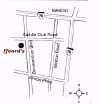|

Precio
Board's (USA)
Buy it for:
Consulta
nuestra
sección de cine
|
Rope
1948 -
USA -
85 min. -
Feature, Color
AMG Rating:
Director:
Alfred Hitchcock
Cast:
James Stewart,
John Dall,
Farley Granger,
Cedric Hardwicke,
Constance
Collier.
More Information:
All Movie Guide
Características del DVD
- Lang.: English / Sub.
in Spanish
Alquílela
por (rent it for): $3.77
(dos días - two days)
Si vive en
Weston (if you live in Weston)
Sinopsis
(All Movie Guide)
Rope,
Alfred Hitchcock's
first color film, was adapted from
Patrick
Hamilton's stage play
Rope's End
by no less than
Hume Cronyn. Loosely inspired by the
Leopold-Loeb
case, the plot concerns two implicitly homosexual college chums, played by
Farley Granger
and John Dall.
Their heads filled with
Nietzchean
philosophy by their kindly professor
James Stewart
(he's grayed at the temples, but he still looks too young for his part),
Granger and
Dall kill a
third friend just for the thrill of it. The boys hide the body in an antique
chest in the middle of their posh apartment, then perversely arrange to hold a
dinner party around the chest, inviting the victim's family, friends and
fiancee (Joan
Chandler), as well as their intellectual role-model
Stewart. As
the guests wander obliviously around the sealed chest, the killers make
snippy, veiled comments about their deed—never going so far as to reveal the
existence of the body nor their involvement in the murder. As all the guests
file out, however, professor
Stewart
begins to suspect that something is amiss. He forces the boys to reveal their
awful secret, whereupon they claim that the inspiration for their murder was
Stewart's
abstract "man and superman" lectures. Before turning the killers over to the
cops, Stewart
absolves himself of guilt in an eloquent curtain speech. In
Rope,
Hitchcock
attempted the daunting technical challenge of filming the entire picture in
one long, uninterrupted take. Actually, there are three changes of camera
angles in the film, occurring at twenty-minute intervals to accommodate reel
changeovers in the projection room (since a reel of film was divided into two
ten-minute minireels back in 1948, the internal reel-breaks are "fudged" by
having a dark object briefly obscure the camera lens, sustaining the illusion
that no editing has taken place).
|


